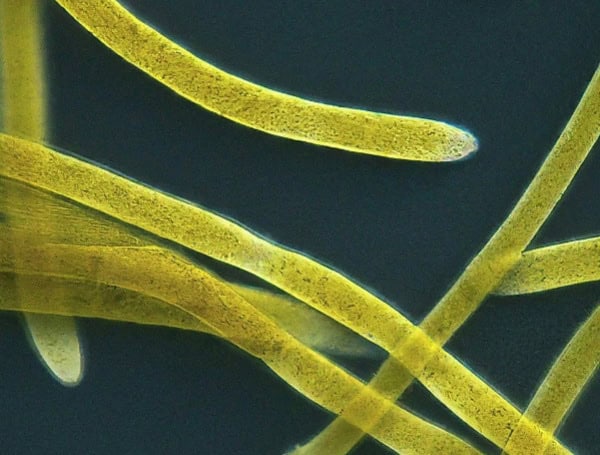POLK COUNTY, Fla. – The Florida Department of Health in Polk County (DOH-Polk) has issued a cautionary advisory today, May 8, 2025, regarding the presence of blue-green algae in the Parker Crago Canal and the northeast shore of Tiger Lake.
The advisory follows the detection of the algae on May 5, 2025, and ongoing water sample testing to determine if toxins are present.
Blue-green algae are known to have the potential to produce toxins that can be harmful to humans, pets, and the environment. Even though toxin levels have not yet been confirmed, DOH-Polk is urging residents and visitors to exercise caution due to the unpredictable nature of environmental conditions.
READ :Early Morning Fire Displaces 9 Clearwater Residents
The health department strongly advises the public to avoid any contact with the affected waters where a visible bloom is present. This includes refraining from drinking, swimming, wading, and using personal watercraft in these areas.
DOH-Polk recommends the following precautions:
- Avoid Contact: Do not drink, swim, wade, use personal watercrafts, or come into contact with waters where there is a visible bloom.
- Wash Thoroughly: If you have any contact with algae or discolored water that smells unpleasant, wash your skin and clothing immediately with soap and water.
- Protect Pets and Livestock: Keep pets and livestock away from the area to prevent them from drinking or coming into contact with the water, as it is not safe for animals when algae blooms are present. Ensure they have an alternative source of water.
- Do Not Use Contaminated Water: Do not use water contaminated by algae blooms for cooking or cleaning dishes, as boiling will not eliminate the toxins.
- Safe Fish Consumption: It is safe to eat fillets from healthy fish caught in freshwater lakes experiencing blooms. However, rinse the fillets with tap or bottled water, discard the guts, and cook the fish thoroughly.
- Avoid Shellfish: Do not eat shellfish from waters with algae blooms.
The Florida Department of Environmental Protection (DEP) is actively involved in monitoring the situation, collecting algae samples from reported bloom locations. Once analyzed at their laboratory, the results regarding toxin levels will be available on the Protecting Florida Together website and the DEP’s Algal Bloom Dashboard.
Understanding Blue-Green Algae:
Blue-green algae are a common type of bacteria found in Florida’s freshwater environments. Blooms occur when there is a rapid growth of these algae, leading to a visible accumulation of cells that can discolor the water and often form floating mats with unpleasant odors. These blooms can appear as scum, foam, or paint-like streaks on the water’s surface in various colors. More information on the appearance of algae blooms can be found on the Protecting Florida Together website.
Factors such as sunny days, warm water temperatures, still water conditions, and excess nutrients can contribute to the development of blue-green algae blooms. While blooms can occur year-round, they are more common during the summer and fall months. It is important to note that not all blue-green algae produce toxins, and the algae may be present in the water even when a visible bloom is not apparent.
Potential Harm and Where to Find Information:
Blue-green algae can produce toxins that pose a risk to human and animal health, as well as the health of ecosystems. Sensitive individuals, including children, the elderly, and those with compromised immune systems, may be at higher risk even at low concentrations and should avoid any exposure.
For more information on the potential health effects of algae blooms, the public is encouraged to visit the Florida Department of Health’s harmful algae blooms webpage.
Up-to-date information on Florida’s water quality status, including public health notifications for harmful algae blooms and beach conditions, is available at Protecting Florida Together. Residents can also subscribe to receive notifications about water quality changes in their area.
Reporting Algae Bloom Issues:
- Algae Blooms: To report an algae bloom, contact the DEP online or call their toll-free hotline at 1-855-305-3903.
- Human Health: If you experience symptoms after exposure to a harmful algae bloom or any aquatic toxin, contact the Florida Poison Information Center at 800-222-1222 to speak with a poison specialist.
- Animal Health: If you believe your pet has become ill after contact with blue-green algae contaminated water, contact your veterinarian.
- Fish Kills: Report any dead, diseased, or abnormally behaving fish or wildlife to the Florida Fish and Wildlife Conservation Commission online or at 800-636-0511.
For any other health-related questions or concerns regarding blue-green algae, please contact DOH-Polk directly at 863-578-2024.
Please make a small donation to the Tampa Free Press to help sustain independent journalism. Your contribution enables us to continue delivering high-quality, local, and national news coverage.
Connect with us: Follow the Tampa Free Press on Facebook and Twitter for breaking news and updates.
Sign up: Subscribe to our free newsletter for a curated selection of top stories delivered straight to your inbox.
